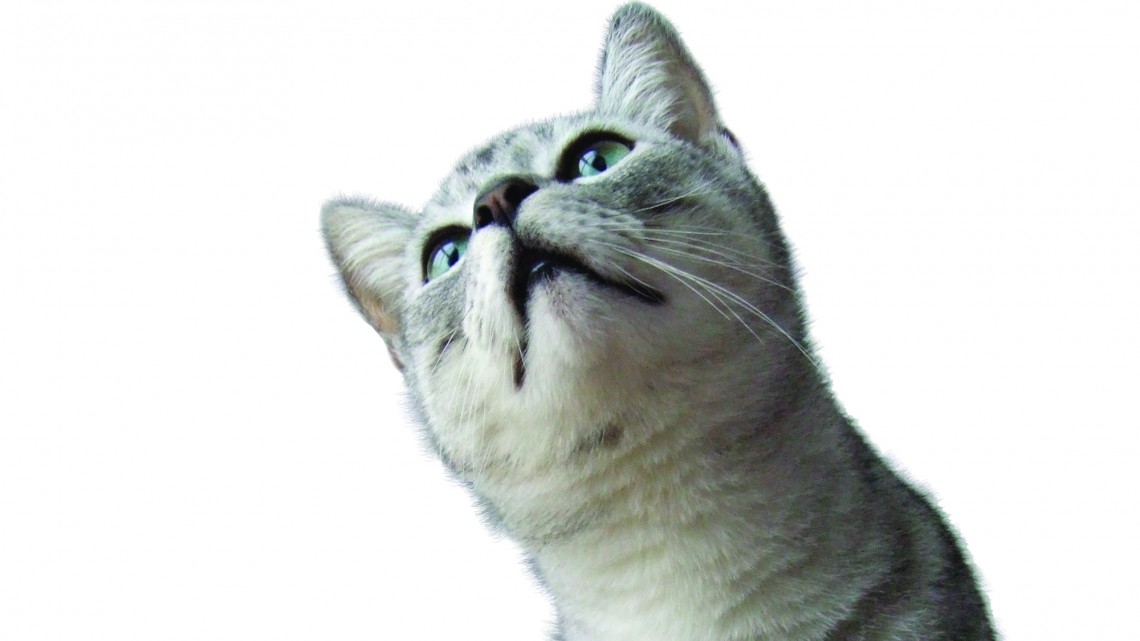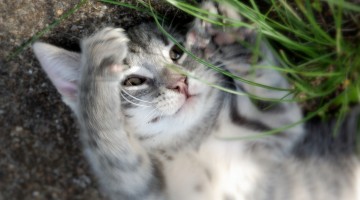Meet Jackson Galaxy, a renowned feline behaviorist and trainer whose empathy for cats took him from shelter worker to Animal Planet celebrity.
When Starsky’s person, Wayne, wondered if the overpowering smell of cat urine in his apartment was real or just his mind playing tricks on him, he called in feline behaviorist Jackson Galaxy. After a trip to Wayne’s apartment, Jackson assured Wayne he wasn’t going crazy. Not only did Jackson notice the smell, but his blacklight revealed the evidence: urine spots glowed everywhere, from the ceiling above the refrigerator to the heating vents on the floor.
After ruling out a medical problem, Jackson researched the ten-year-old Maine coon’s environment and lifestyle.
Territorial issues became apparent. Starsky’s neighborhood included many roaming strays. One of these, Whitey, regularly let himself in through the cat door, ate Starsky’s food, and used his litter box. To add to the local cat congestion, a breeder lived next door and his back yard housed many intact cats.
“Starsky was bravely defending his turf, yet having it consistently defiled by the interloper,” Jackson reports. “It was a frustrating, terrorized and tiring way to live one’s life. I recommended that Wayne quickly finish a backyard fence he already had in progress, to block off Whitey’s entrance and let Starsky enjoy his turf. Wayne also cut off food to the strays, and scared off Whitey whenever he approached.”
When Jackson checked back a few weeks later, the spraying had stopped. “Starsky can finally breathe,” he says. “And that makes Wayne breathe better too.”
Early days
Jackson discovered his knack for understanding feline behavior in the 1990s while working at the Humane Society of Boulder Valley in Colorado. Faced with a roomful of stressed strays, Jackson, who is also a musician, songwriter and actor, decided to try a technique he’d read about in Anitra Frazier’s The New Natural Cat. He tried a slow blink exchange, intended to establish a link between human and cat.
Soon the room was quiet, and Jackson knew his life had taken a new direction. He felt compelled to find more ways to get through to the cats. “The more stressed cats often sat in their litter boxes,” he says. “I wanted to do something to make them more adoptable.” Since few feline training resources existed at the time, Jackson’s work began with what he calls “gut based efforts.” His goal was to help the cats feel better while in their kenneled environment. He began using play techniques to help them mimic their natural feline behavior.
“I call it ‘the raw cat’,” he explains. “All cats have an instinct to hunt, catch, kill and eat prey. By getting them involved in this through play, they let off steam, they became happier and more confident.” To his delight, the cats were soon no longer spending their days in their litter boxes.
Growing success
In 2001, Jackson teamed up with holistic veterinarian Dr. Jean Hofve and formed Little Big Cat, offering mind-body consultations to cat guardians, focusing on the connection between a cat’s physical and behavioral health. Working with Dr. Hofve, Jackson also began incorporating her flower essence remedies into his programs, and is now the owner and president of Spirit Essences.
Jackson moved his practice from Boulder to the Los Angeles area in 2007. It was a step that opened up exciting new doors for him. “As soon as I landed, word got out that I was a cat guy who looked like a biker, so TV shows brought me in,” Jackson chuckles. “I was the official cat behaviorist for Game Show Network’s Think Like a Cat and am the cat behavior expert for the new season of Animal Planet’s Cats 101.
“It’s a much more cat-enlightened era now than when I began,” Jackson muses. “People are more open to the idea that you can train a cat. They’re willing to work with their cats, and to seek help to solve their problems.”
How he works
Jackson has addressed a variety of cat behavior problems over the last 16 years, but the most common ones he sees are a failure to use the litter box, and feline aggression. Before addressing any issue, every cat must first obtain a clean bill of health, to make sure medical conditions aren’t the cause of his or her behavior changes. Then Jackson does some detective work. He leaves the client with a plan of action, and continues to check in until the problem is resolved. Depending on how much time the client can commit, the results are often quick and progress can be seen in four to six weeks.
“I teach 99% of my clients how to play with their cats,” Jackson says. “The more cats play and carry out their natural instincts, the more their confidence builds.” He adds that operant conditioning along with play makes up much of the training.
Jackson admits this is sometimes met with surprise. “Clients think, ‘of course I know how to play with my cat!’ But I’m talking about a very interactive, cardio-active play session. You can’t have one eye on the newspaper while you dangle a toy. You’ve got to be more involved than that, and stay involved for the time you’ve committed to.”
A high protein meat treat concludes the play session. “It completes the hunt-catch-kill-eat cycle, and the cat comes to expect it.”
Jackson also uses reward-based and click and treat training to address specific problems. “If your cat is food driven, you can make that work for you. I’ve taught a food bully to sit and stay and wait for his food.”
Hands full of cats
Though no longer in a shelter environment, Jackson remains committed to shelter cats. In addition to volunteering whenever he can, he teaches shelter staff and volunteers methods to improve adoptability and solve behavior problems. He actively spreads the word on the importance of spaying/neutering, and hopes to see it mandated into law. He is also active with the Paw Project, a growing anti-declawing movement.
“I’m just keeping my hands full of cats,” he says. “It’s an incredibly gratifying way to spend your life.”





No Comment